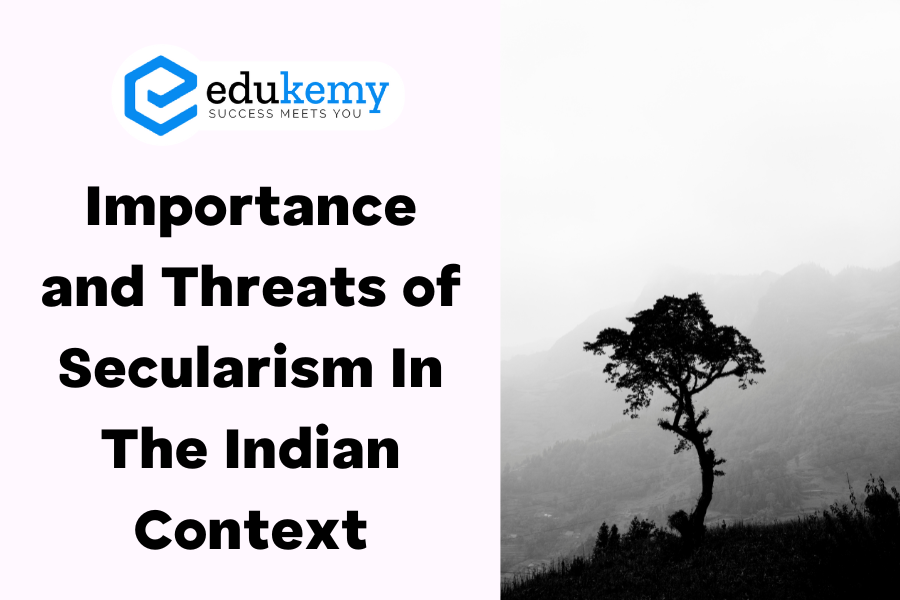
Secularism in the Indian context holds profound significance, reflecting the country’s diverse tapestry of religions, cultures, and traditions. At its core, it embodies the principle of religious neutrality, ensuring that the state remains impartial and respects all faiths equally. This principle is enshrined in the Indian Constitution, emphasizing the importance of fostering harmony and inclusivity among its myriad religious communities. However, despite its foundational importance, secularism in India faces a myriad of threats that jeopardize its essence and integrity. Communal tensions, political exploitation of religious identities, and acts of religious extremism pose significant challenges to the fabric of secularism, potentially undermining the nation’s social cohesion and democratic values. Thus, understanding the importance of secularism and addressing the various threats it confronts are imperative for sustaining India’s pluralistic ethos and democratic ethos.
Contents
Threats to Secularism
- While, the Indian Constitution declares the state being absolutely neutral to all religion, our society has steeped in religion.
- Mingling of Religion and Politics that is mobilisation of votes on grounds of primordial identities like religion, caste and ethnicity, have put Indian secularism in danger.
- Communal politics operates through communalization of social space, by spreading myths and stereotypes against minorities, through attack on rational values and by practicing a divisive ideological propaganda and politics.
- Politicisation of any one religious group leads to the competitive politicisation of other groups, thereby resulting in inter-religious conflict.
- One of the manifestations of communalism is communal riots. In recent past also, communalism has proved to be a great threat to the secular fabric of Indian polity.
- Rise of Hindu Nationalism in recent years have resulted into mob lynching on mere suspicion of slaughtering cows and consuming beef.
- In addition with this, forced closure of slaughterhouses, campaigns against ‘love jihad’, reconversion or ghar- wapsi (Muslims being forced to convert to Hinduism), etc. reinforces communal tendencies in society.
- Islamic fundamentalism or revivalism pushes for establishing Islamic State based on sharia law which directly comes into conflict with conceptions of the secular and democratic state.
- In recent years there have been stray incidences of Muslim youth being inspired and radicalized by groups like ISIS which is very unfortunate for both India and world.
- Inter-religious conflict results from the competitive politicisation of other groups as a result of the politicisation of any one religious organisation.
FAQs
Q: Why is secularism important in India?
Secularism is crucial in India to uphold the principles of equality, freedom of religion, and communal harmony. It ensures that the state remains neutral towards all religions, allowing individuals to practice their faith freely without fear of discrimination or persecution.
Q: How does secularism contribute to India’s cultural diversity?
Secularism promotes inclusivity by respecting the diverse religious beliefs and practices of India’s vast population. It fosters a society where people from different faiths can coexist peacefully, enriching the country’s cultural tapestry.
Q: What are the threats to secularism in India?
One significant threat is the rise of religious extremism and communal politics, which exploit religious identities for political gains and sow discord among communities. Additionally, incidents of religious discrimination and violence undermine the secular fabric of the nation.
Q: How can citizens safeguard secularism in India?
Citizens can uphold secularism by actively promoting interfaith dialogue, fostering mutual understanding, and resisting divisive ideologies that seek to polarize society along religious lines. Participating in democratic processes and advocating for policies that uphold secular principles is also essential.
Q: What role does the government play in preserving secularism?
The government has a responsibility to ensure that laws and policies are secular and treat all religions equally. It should refrain from favoring any particular religion or interfering in religious matters. Moreover, promoting secular education and awareness initiatives can help reinforce the importance of secularism in Indian society.
In case you still have your doubts, contact us on 9811333901.
For UPSC Prelims Resources, Click here
For Daily Updates and Study Material:
Join our Telegram Channel – Edukemy for IAS
- 1. Learn through Videos – here
- 2. Be Exam Ready by Practicing Daily MCQs – here
- 3. Daily Newsletter – Get all your Current Affairs Covered – here
- 4. Mains Answer Writing Practice – here

